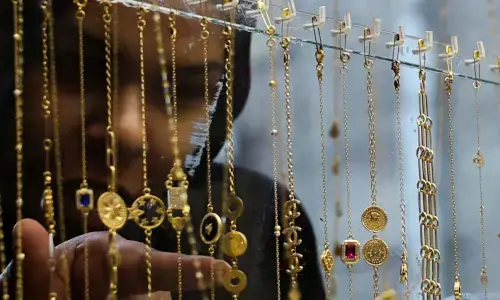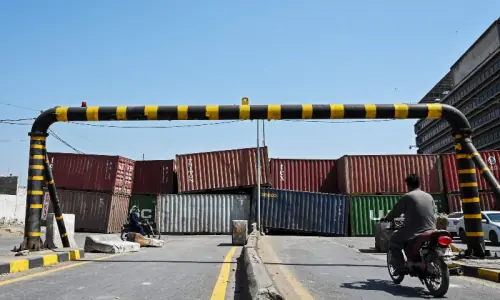KARACHI: The sky was sunny sometimes and cloudy the next, but the 26 women electrical engineers in Barbie pink t-shirts and canary yellow safety helmets along with big, bulky boots and thick rubber gloves wouldn’t let an overcast sky dampen their spirits. They cheerfully went about their work, installing the solar panels on the rooftop of the Husseini Dar-ul-Atfal orphanage in Liaquatabad Town on Saturday afternoon.
Speaking to Dawn, these women of energy, some of whom were undergraduates, mostly fourth year students, and also graduates, said that they were glad to have installed solar panels on the rooftop of the orphanage.
All were part of an NED-certified course backed by LADIESFUND Energy (Pvt) Ltd, a woman-owned, primarily women-run renewables company that is currently also engaged in building a 50 megawatts solar generation plus storage project in Gharo, Sindh.
Iman Batool of Dawood University said that it was the first time in Pakistan’s history that an all-female team had come up to do that kind of work. “So my parents have been very supportive,” she said.
For the first time in the country, all-female team installs solar panels on the rooftop of a residential institution
Aruba Yousuf Iraqi of the Dawood university said that her parents were so proud of her and the team “that they have said that they will call us when they decide to install solar panels on their roof,” she smiled.
Areeba, of the NED university, reminded that solar energy is the future.
“It is going to be needed badly in the near future as electricity bills have skyrocketed with new charges and taxes being included every month. And switching to solar energy is a one-time cost with more benefits,” she said.
Muskaan Iqbal, also from the NED university, said that solar panels have a life of 25 years. “That is, if you take care of their maintenance and safety. These days, children or other elements can be the cause of some damage to the panels or their wiring,” she added.
“It is also all DC or direct current which is more dangerous than AC or alternating current. Naughty kids also shouldn’t be allowed to disturb the wiring so care must be taken. Then solar panels are also known to be stolen,” she said, pointing to protective wiring with current installed all over the rooftop walls to keep away thieves and robbers.
When reminded that batteries to provide power during the night can cost a lot, Farhat Anjum, who also belonged to the NED said that they are still cheaper than paying exorbitant electricity bills month after month. “You should look at the battery costs as an investment. Then there is also so much research going on in batteries,” she added.
When told that they were all great examples of girl power, they laughed and asked to call it ‘girl electric power’.
Tara Uzra Dawood, the founder and CEO of LADIESFUND Energy (Pvt) Ltd, who also received training with the 28 women electrical engineers, told Dawn that the installation is of 24 kilowatts with six lithium batteries, which happen to be the best kind of batteries that would last 10 years and also come with a five-year warranty. “It is the first time in the history of not just the country but the world that an all-female team is solarising buildings. We have solarised factories too,” she said.
“Right now the women are interns, but we are hopeful that with their expertise they will be hired by the industry. We have 86 more girls on our wait list. Among this group there are two girls from Balochistan, two from Nawabshah and one from Sanghar,” she added.
Dr Mohammad Mohsin Awan, associate engineer in the department of electrical engineering at the NED university, who is also the director of the Renewable Energy Centre at the NED, trained the women engineers.
He said that they were already studying or had studied electrical engineering so only required five days of training in solar installation.
“They trained for five days from 9am to 5pm each day. I found them to be very sincere and hard workers,” he shared.
Hussein Dada, whose family built the Husseini Dar-ul-Atfal, also spoke on the occasion. The event was also attended by the Mayor of Karachi Barrister Murtaza Wahab as the chief guest, who greatly appreciated the initiative.
Published in Dawn, August 11th, 2024






























